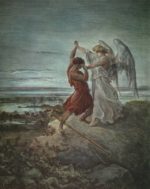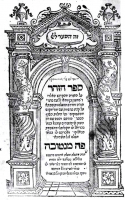
What is a Soul? III. The Many Souls of Man
…[H]e who tries to cure the soul, wishing to improve the moral qualities, must have a knowledge of the soul in its totality and

…[H]e who tries to cure the soul, wishing to improve the moral qualities, must have a knowledge of the soul in its totality and

In the biblical story of the creation of Adam, the Torah states: Then the Eternal G‑d formed man of the dust of the ground, and

So the present passed over before him; and he himself lodged that night in the camp. And he rose up that night, and took his

Then drew near the daughters of Zelophehad …. of the families of Manasseh, the son of Joseph; and these are the names of his daughters:

In the six hundredth year of Noah’s life, in the second month, on the seventeenth day of the month… all the fountains of the great
The previous Lubavitcher Rebbe, the Rebbe Rayatz (a.k.a. the Fridriker Rebbe) told the story about his father, the Rebbe Rashab. Once the brother of Rebbe